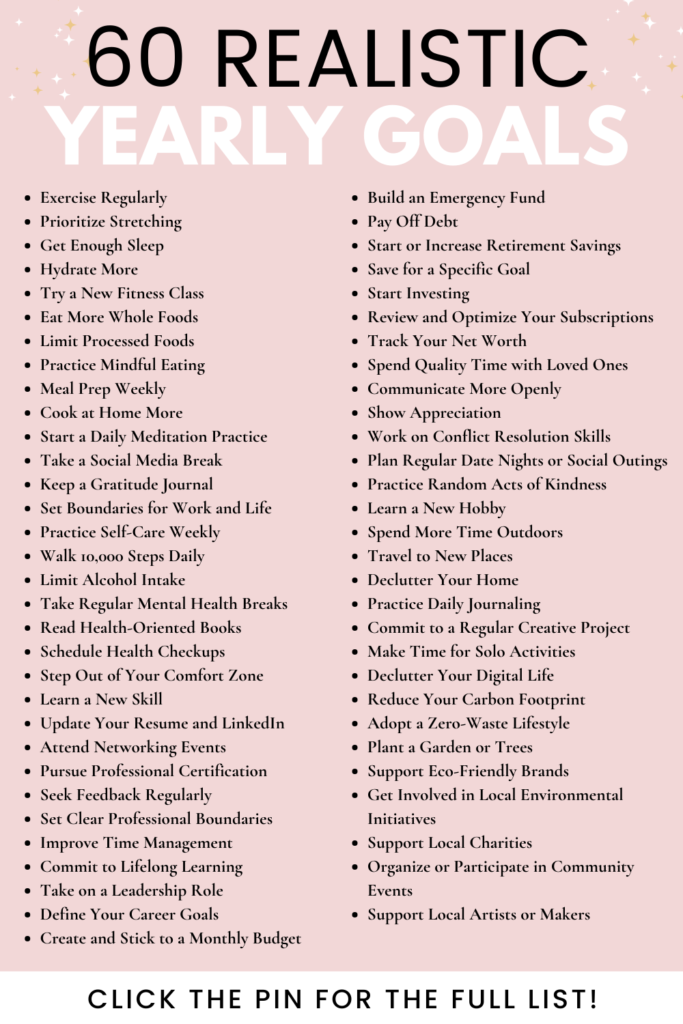Ready to make some changes? No matter what you’re looking for, you’ll find below some great yearly goals to set to better yourself and make meaningful changes to your life.
My best advice is to pick the ideas that speak the most to you, prioritize the most important ones, and set up a calendar to implement changes gradually.
Trying to do everything at once and become your “perfect self” overnight is likely to kill your motivation.
Instead, go step-by-step. So for example, if your goal is to go to the gym 5 times a week and you’re starting from nothing, maybe going 2 times a week for quick sessions and then slowly increasing the frequency and duration, will help you reach your goal.
It’s all about finding balance and thriving to better yourself little by little without being too harsh or too judgmental of yourself.
Health and Wellness Ideas
Physical Health
- Exercise Regularly – Commit to at least 30 minutes of physical activity, 5 days a week, like walking, jogging, or strength training.
- Prioritize Stretching – Stretch for 10 minutes every day to improve flexibility, posture, and reduce stress.
- Get Enough Sleep – Aim for 7–9 hours of quality sleep each night for optimal physical and mental recovery.
- Hydrate More – Drink at least 8 cups of water a day to support energy levels and overall health.
- Try a New Fitness Class – Experiment with yoga, Pilates, or kickboxing to add variety and keep workouts fun.
Nutrition and Diet
- Eat More Whole Foods – Focus on adding fruits, vegetables, lean proteins, and whole grains to every meal.
- Limit Processed Foods – Cut down on sugary drinks, fast food, and processed snacks.
- Practice Mindful Eating – Eat without distractions, savor each bite, and listen to hunger cues.
- Meal Prep Weekly – Dedicate a day to preparing healthy meals for the week to avoid unhealthy last-minute choices.
- Cook at Home More – Aim to cook at least 4 meals a week to control ingredients and portion sizes.

Mental and Emotional Wellness
- Start a Daily Meditation Practice – Spend 5–10 minutes a day practicing mindfulness or deep breathing.
- Take a Social Media Break – Schedule regular tech-free hours or a weekly “digital detox” to improve mental clarity.
- Keep a Gratitude Journal – Write down three things you’re grateful for each day to boost positivity and reduce stress.
- Set Boundaries for Work and Life – Establish clear work hours and prioritize time for relaxation and hobbies.
- Practice Self-Care Weekly – Dedicate time to activities that make you feel happy, such as reading, baths, or spending time outdoors.
Personal Growth and Habits
- Walk 10,000 Steps Daily – Track your steps to ensure you’re staying active throughout the day.
- Limit Alcohol Intake – Commit to having alcohol-free days or cutting back to improve your overall health.
- Take Regular Mental Health Breaks – Pause throughout the day to reset and reduce stress.
- Read Health-Oriented Books – Read one book a month about wellness, fitness, or nutrition to educate and inspire yourself.
- Schedule Health Checkups – Stay on top of your health by booking annual physicals, dental visits, and eye exams.
- Step Out of Your Comfort Zone – Challenge yourself to try new things that may feel intimidating but offer growth.

Career and Professional Goals
Career Growth & Skill Development
- Learn a New Skill – Commit to learning something that enhances your career, such as coding, public speaking, or a new software program.
- Update Your Resume and LinkedIn Profile – Refresh your professional profiles to reflect recent achievements, skills, and goals.
- Attend Networking Events – Participate in at least one professional networking event or conference each quarter to expand connections.
- Pursue Professional Certification – Enroll in a certification program or course to improve your qualifications and credibility.
- Seek Feedback Regularly – Request constructive feedback from peers or supervisors to identify strengths and areas for growth.
Productivity and Work-Life Balance
- Set Clear Professional Boundaries – Establish work hours and stick to them to avoid burnout and maintain a healthy work-life balance.
- Improve Time Management – Use tools like planners, calendars, or apps to prioritize tasks and stay organized.
- Commit to Lifelong Learning – Read one book per month related to your field, leadership, or personal development.
- Take on a Leadership Role – Volunteer for a project, mentor a colleague, or lead a team initiative to build leadership skills.
- Define Your Career Goals – Write down short-term and long-term career objectives and create an action plan to achieve them.

Financial Goals
- Create and Stick to a Monthly Budget – Track your income and expenses to ensure you’re saving and spending mindfully each month.
- Build an Emergency Fund – Aim to save 3–6 months’ worth of living expenses to prepare for unexpected situations.
- Pay Off Debt – Focus on paying down credit cards, loans, or other debts by setting specific repayment goals.
- Start or Increase Retirement Savings – Contribute regularly to a retirement plan like a 401(k), IRA, or other investment accounts.
- Save for a Specific Goal – Set a savings target for something important, like a vacation, home, or major purchase, and break it into monthly contributions.
- Start Investing – Begin investing in stocks, bonds, or retirement funds to grow your wealth over time.
- Review and Optimize Your Subscriptions – Evaluate monthly subscriptions (e.g., streaming, gym) to cancel unused services and save money.
- Track Your Net Worth – Keep track of assets, debts, and savings to understand your financial growth over time.

Relationships and Social Life
- Spend Quality Time with Loved Ones – Make a conscious effort to have regular, undistracted time with your partner, family, or close friends.
- Communicate More Openly – Practice honest and open communication with those close to you, sharing your feelings, needs, and thoughts.
- Show Appreciation – Regularly express gratitude and appreciation to those you care about through small gestures, kind words, or acts of service.
- Work on Conflict Resolution Skills – Learn and practice healthier ways to handle disagreements, focusing on compromise and understanding.
- Plan Regular Date Nights or Social Outings – Set aside time for romantic dates, family activities, or friend meetups to keep relationships fresh and fun.
- Practice Random Acts of Kindness – Aim to do at least one kind thing for someone else every week, whether it’s complimenting someone, helping a neighbor, or donating time or items.

Lifestyle and Hobbies
- Learn a New Hobby – Pick up something you’ve always wanted to try, like painting, gardening, photography, or learning a musical instrument.
- Spend More Time Outdoors – Commit to spending at least an hour outdoors each day, whether hiking, walking, or simply enjoying nature.
- Travel to New Places – Plan to visit a new city, country, or nearby attraction to explore different cultures, foods, and experiences.
- Declutter Your Home – Focus on organizing and decluttering your living space to create a more peaceful, functional environment.
- Practice Daily Journaling – Set aside time each day or week to journal your thoughts, experiences, or creative ideas, fostering mindfulness and self-expression.
- Commit to a Regular Creative Project – Start or maintain a creative hobby like writing, painting, or DIY projects to tap into your creative side.
- Make Time for Solo Activities – Dedicate time to solo adventures or hobbies that recharge you, like solo travel, hiking, or reading.
- Declutter Your Digital Life – Clean out emails, old files, and apps to organize your digital space and reduce stress.

Environmental and Community Goals
- Reduce Your Carbon Footprint – Make small changes like using public transportation, walking, or biking instead of driving, and reduce energy consumption at home.
- Adopt a Zero-Waste Lifestyle – Begin reducing single-use plastics by using reusable bags, containers, and bottles, and focus on buying products with minimal packaging.
- Plant a Garden or Trees – Grow your own herbs, vegetables, or plants at home or volunteer to help plant trees in local parks or community spaces.
- Support Eco-Friendly Brands – Choose to support businesses that prioritize sustainability, ethical sourcing, and environmental responsibility in their products.
- Get Involved in Local Environmental Initiatives – Volunteer with or support local environmental groups, participate in clean-up events, or help organize community sustainability projects.
- Support Local Charities – Dedicate time or resources to volunteer with or donate to a cause you care about in your community, whether it’s helping the homeless, supporting education, or animal welfare.
- Organize or Participate in Community Events – Host or take part in community activities like fundraisers, local cleanups, or cultural festivals to bring people together and support your neighborhood.
- Support Local Artists or Makers – Shop from local artisans, creators, or small businesses to support the local economy and reduce your environmental impact.
Save it on Pinterest for later:



